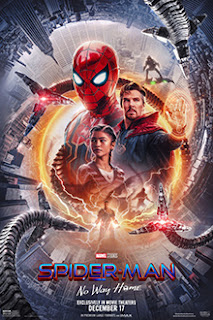Score: A-
Directed by Maggie Gyllenhaal
Starring Olivia Coleman, Jessie Buckley, Dakota Johnson, Ed Harris
Running time: 122 minutes
Rated R
Long Story Short: The Lost Daughter is the film adaptation of a novel by Elena Ferrante about a middle-aged woman whose experiences as a young mother resurface during a rockier-than-expected vacation. Olivia Coleman is fantastic as the lead; the opposite of bombastic, she is utterly convincing in a role that needed just that. While the movie has little plot, it is a fascinating exploration of motherhood and much that affects it in the modern world. Highly recommended.
Leda (Coleman) arrives on a Greek island hoping for a quiet, restful vacation, but soon finds the experience quite a bit less soothing than hoped for. Her beachside accommodations leave something to be desired, including a genial but intrusive manager, Lyle (Harris). Sunbathing and writing on the beach, where she spends most of her days, Leda's peace and quiet are interrupted by new guests, a large, young, rowdy family. Mostly annoyed by them, Leda nevertheless is drawn to one young mother whose presence brings back powerful memories for her. Despite seemingly huge differences, the women find a strange connection.
The Lost Daughter is a well-made, powerful character-driven drama led by excellent performances and an engrossing script. Olivia Coleman is among the very top actors working today, and it's good that she plays the main character, Leda, because the film is focused on her like a laser. Jessie Buckley, playing Leda as a young mother in a substantial number of flashbacks, is also great and gets the more passionate side of the character. But Coleman, as usual, is just fantastic. She truly inhabits the part, as a middle-aged professor on a solo vacation. Early on, the film effectively sets a very realistic stage; as beautiful as the Greek setting is, Leda endures a number of mundane but realistic and acutely-observed annoyances, from rotten house fruit to getting her umbrella set up just right. There is really only the thinnest of plots here, to give a little direction for the characters, but it's really those characters themselves that deserve all the attention. The cinematography is also good but, again, somewhat lost as most of the attention (mine, at least) was thinking about the characters. I think the pacing was also pretty good - for a two hour movie with little plot - but I also watched it in a few chunks at home, so seeing it straight through might be different.
The characters are the true draw in this film, as well as the themes that emerge from their realistic circumstances. Leda may be the protagonist of the story, but a flawed one at that. She is rather aloof and distant, often curtly rejecting friendly overtures from others at the beach; she also makes a mystifying choice halfway through that causes pain to the very people she starts to cling to. Granted, I could also put myself in her exasperated shoes when young men keep rudely shattering her peace. The family Leda observes shocks her with its combination of closeness and occasional generosity, along with chaos and occasional hostility. No wonder that she is fascinated by Nina, the young mother, whose background seems so different to hers yet her daily life - raising a difficult young daughter - feels so familiar. This is where the flashbacks come in, showing Leda's struggle to raise two daughters of her own while trying to build her own academic career. There are some minor dramatic flourishes, but this is the central idea, to me: illustrating modern motherhood. And while I am not a mother nor even married, it struck a cord with me. Not about the mothers, who show great strength and love despite some failings, but anger at my own gender. I know plenty of great fathers and husbands, but too often men fail to be true partners, particularly in sharing in the raising of their children - and this, to me, is the root of Leda and Nina's struggles and even trauma. So, is this a cheerful film? No, but it is a strong, captivating one, and has essential observations on the very nature of domestic relations.
***
The Lost Daughter is a leading awards candidate among 2021 films (Oscar nominations aren't out until February 8; why so late???), and I would definitely agree even if it isn't a "favorite" of mine. I am conflicted about its release on Netflix. On one side, it's great that this is available to such a wide audience (though I doubt all that many will actually see it). And streaming in general offers a more realistic pathway for smaller films like this in the future. But I am sure I would have been even more engrossed by this in a theater, and I really hope that most Oscar hopefuls will continue to get at least a brief wide release in theaters. Anyway, to repeat, this is not a cheerful one but it is a great choice for anyone looking for a mature, realistic drama and one with a lot of interesting things to say about modern life.
* By http://www.impawards.com/2021/lost_daughter.html, Fair use, https://en.wikipedia.org/w/index.php?curid=68864633






